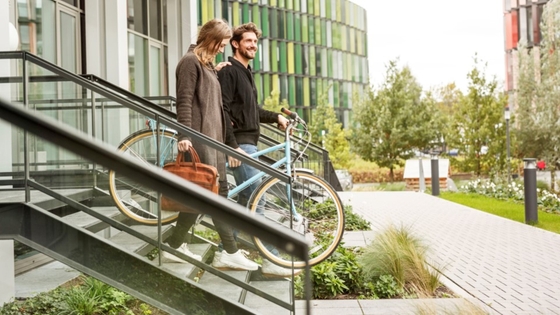
Q&A with Associate Professor Seana Gall
Associate Professor Seana Gall is a senior research fellow and Heart Foundation Future Leader Fellow at University of Tasmania’s Menzies Institute for Medical Research. Her research focuses on heart disease and stroke.
What are you currently researching?
Stroke is a type of cardiovascular disease that affects the brain. Strokes happen when the flow of blood and oxygen to the brain is interrupted. This can happen because of either a blocked artery, or bleeding from an artery into the brain. The impact of a stroke on a person depends on which part of the brain is affected. For example, a stroke might affect a person's ability to talk, read or write, or the ability to move their arms and legs. Over 100 people have a stroke every day in Australia. At least 80 per cent of strokes can be prevented by managing risk factors such has quitting smoking, managing blood pressure and improving diet.
I am an epidemiologist (a person who studies how often diseases occur in the population). My team and I use population health research to answer questions about how to prevent strokes. We study large groups of people; both healthy adults (some we have followed since they were children) and people who have already had a stroke. We use these studies to identify new targets to prevent stroke or to help reduce the risk of a person having another stroke. We are also running a study called Personalised Knowledge to Reduce the Risk of Stroke (PERKS-International)*. People participating in the study get a free health check to identify their stroke risk factors. We look at their blood pressure, cholesterol, blood sugar levels, weight, physical activity, diet, and smoking. People are then given information about their stroke risk factors in two different ways using their mobile phones. The study will show us which way of providing risk factor information works best to motivate and support people to reduce their risk of stroke. My aim is to reduce the number of strokes that happen each year in Australia. We can do this by identifying new prevention targets and by testing new interventions to help people manage their risk factors. * To find out more about the PERKS-International study, please visit the website.
What difference will your research make to people’s cardiovascular health in Australia?
Even though stroke is largely preventable, in 2019, on average, 23 people died of stroke every day. My research will make a difference to people's lives by helping health professionals to identify and manage people's risk factors for stroke at the right time, with easy-to-use inexpensive interventions. My research will increase our understanding of the causes of stroke in men and women at different ages. While people typically think of men as being most at risk of cardiovascular disease, including stroke, the rate of women and men dying from stroke each year in Australia is similar.
What motivated you to do your research?
I love the process of identifying a problem, figuring out how you're going to tackle it and then delving into the data to get an answer. I started my research career at Monash University with a science degree. I was very interested in physiology, which is how our body works. I initially did research in a laboratory where we used animal models to answer questions about physiology. While I loved the research itself, I am a 'people person' and wanted to do research with people. I was lucky enough to be accepted into the PhD program at the University of Melbourne in epidemiology, at what was the National Stroke Research Institute. At the time I knew very little about epidemiology, but I learned on the job! My PhD involved working directly with people that had had a stroke in a large cohort study (a type of study that follows people over time to see what happens to them). I had the privilege of being invited into people's homes where they told me all about their recovery and how they managed their health. I got to see people's resilience but also their struggles. It motivated me to try to understand how we can prevent more strokes from happening.
Are there any recent achievements or discoveries you can share with us?
My greatest achievement in the past year has been leading the Synergies to Prevent Stroke (STOPstroke) program. Stroke researchers from across Australia and New Zealand work together on stroke prevention. The STOPstroke program is funded by the National Health and Medical Research Council through a Synergy Grant worth $5 million. Our program has three themes:
Being able to better identify who is at risk of stroke.
Improving the prevention of stroke.
Building infrastructure for stroke surveillance.
As part of STOPstroke, I have had the opportunity to lead my first randomised controlled trial (PERKS-International). We recently started recruitment for the study, which will include over 800 people from Australia and New Zealand.
What role has Heart Foundation funding had in your career journey?
I have been fortunate enough to have Heart Foundation funding since I was a postdoctoral fellow. This has included two Future Leader Fellowships, with my current Fellowship finishing at the end of 2022. I cannot express how much the support of the Heart Foundation has meant to me. The funding has allowed me to dedicate time to my research, including supervising junior researchers completing their PhD. It has allowed me to make significant advances in understanding ways to improve the prevention and management of stroke in Australia. These advances that would not have been possible without Heart Foundation support.
Do you have a message for Heart Foundation supporters?
The Heart Foundation is at the forefront of reducing cardiovascular disease in Australia. Their support of the research community through funding is truly a lifeline. Australia is a world-leader in heart and stroke research, largely due to the support of the Heart Foundation. They provide much needed support for early and mid-career researchers. For me, the Heart Foundation’s support has allowed me to continue doing the research that I love. It has helped me to make advances in our understanding of how to prevent and manage stroke to get the best outcomes for Australians.
You might also be interested in...

Improving the prevention and management of stroke
Improving the prevention and management of stroke

Research funding portfolio
Understand the application process and requirements of our various funding programs.

Applying for research funding with the Heart Foundation
Discover more about our various funding programs, requirements, and application dates now.
Last updated19 March 2024
Last reviewed19 March 2024